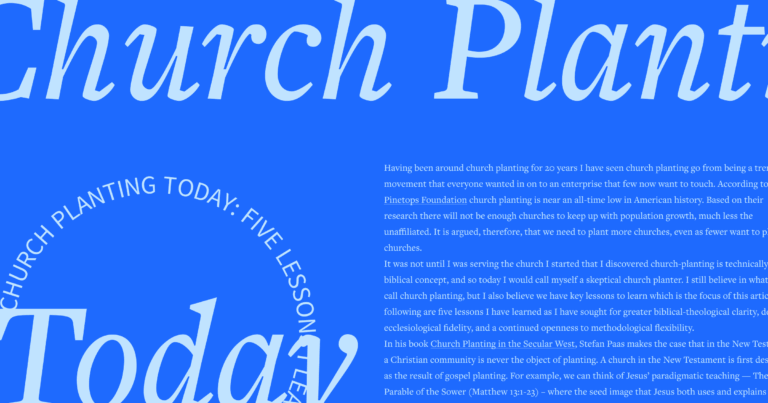
If you are someone who is currently planting a church or interested in church planting, the work, as you know, is daunting.
According to Pinetops Foundation church planting is near an all-time low in American history.1 Based on their research there will not be enough churches to keep up with population growth, much less the religiously unaffiliated.2 In other words, we need to plant more churches, even as fewer want to plant churches.
To this end, I want to share five lessons I’ve learned as someone who’s spent 20 years around church planting. As I do so, I hope to encourage you as a planter or potential planter.
Each of these lessons is informed by a simple principle: We plant by faith, not by sight (2 Cor 5:7). Or we might say, without faith it is impossible to plant a church (Heb 11:6).
But what specifically do I mean by faith in the context of church planting? As I’ll flesh out, it means accepting that:
- Your church is not as important as you think
- You are not in control
- Your plans will fail but not the Lord’s
- You’re called to labor with patient ambition
- Your work is hard but should not be heavy
Let’s explore these together.
1. You’re not planting the church—it’s already planted
In his book Church Planting in the Secular West, Stefan Paas makes the case that most church planting assumes an understanding of the church that perpetuates what Jesus prayed against. We often plant churches because we think our particular type of church is needed, and therefore we believe our church is “the church.” However, if we think that our church is the only viable church of Jesus Christ in our region, we negate Jesus’s prayer for us to be one as he and the Father are one (John 17:21–23).
Instead, to embrace Jesus’s prayer we need to see church planting as both an evangelical and catholic enterprise. By evangelical, I mean we see the gospel as central to the mission of the church; we plant churches because we want as many people as possible to know the gospel of Jesus Christ. By catholic, I mean we recognize the church’s universal presence; the church of Jesus Christ most likely already exists wherever you’re planting a church.
This means that church planting must never be a zero-sum game. Cities, towns, and suburbs need all kinds of churches, and so while your church matters, it is not the only church doing the Lord’s work. You are not planting something that does not already exist; you are planting a tree in the midst of an already existing forest.
Practically, this means that one of the healthiest things a church planter can do at the beginning of their work is recognize the faithful leaders that have already been laboring in the field before they ever arrived (1 Cor 3:9). Your church plant will reap what others have sown (1 Cor 3:6–8). In my experience, churches primarily grow through transfer and transplant growth, with growth by conversion lagging significantly behind.
So why start another church? The reason to start a church is really to support the entire church in your region for the sake of formation and evangelism.
2. Give up the control you never really had
From day one church planters are involved with every aspect of the church’s life, including website design, setup and tear down, collating worship bulletins, administration, cleaning toilets, restocking supplies, to endless hosting in their homes. And then, of course, there is preaching, teaching, sacraments, casting vision, pastoral care, weddings, burials, developing leaders, discipling new believers, and evangelism. This is the daily anxiety that St. Paul knew on a much larger scale (2 Cor 11:28). Your whole life is a drink offering being poured out into and for a community of people (Phil 2:17; 2 Tim 4:6)
It is inevitable then that the more invested a church planter is in his work the more it will be a reflection of him because of how much it has been shaped by him.
Yet in order for the church to mature and grow, a church planter will eventually have to shift towards doing only what he can do (cf. Acts 6:2; 7). The greatest barrier to a church plant’s maturation is sometimes the planter. While control in the early days of a church’s life may be a form of care, eventually it will be a liability. The planter must be willing to give up control.
Yet giving up control does not mean you stop leading. It means you invite others into your leadership (Titus 1:5). Mark Glanville refers to this as creating a “leaderful church” which he says is similar to jazz musicians sharing the stage and each drawing out the best in the other while never dominating the other.3 Of course there’s always a leader of the band but the best band leader uses his leadership for the sake of others and their flourishing.
Personally, I never realized how much giving up control would feel like dying. But, whether our control is real or imagined, to die to anything is to trust Christ more deeply and to believe that he is Lord of his church (Eph 1:22–23; Col 1:18). In our death we fall into the hands of the crucified Christ who rose again. We are dying for the sake of something better than what we started (Eph 3:20).
Personally, I never realized how much giving up control would feel like dying.
If you care deeply about all the domains of your church’s life, believe Jesus cares about them more and was willing to die and rise for them (Acts 20:28). And then believe he wants you to entrust these areas to the saints you are called to equip (Eph 4:12). Their participation in the work of ministry runs parallel to your ability to give up control. Their participation in the work is the resurrection that you are willing to die for. As Jesus says in John 12:24, “unless a grain of wheat falls into the earth and dies, it remains alone; but if it dies, it bears much fruit.”
3. Your plans may fail, but the Lord’s purpose will stand
Church planters by temperament are often planners, dreamers, and visionaries. We are full of ideas. And yet all church planters know, or at least should, that it is ultimately the Lord’s purpose that will stand (Prov 19:21).
Faithful church planting requires humility. If a church planter is not self-aware, he may embrace his work of church planting like a de facto work of the Lord. He runs the risk of conflating his plans with God’s, his work as the work of God. This can lead to all sorts of pathologies and potential abuse in the church.
Church planters must reckon their plans in relationship to the Lord’s. Failing to do so, planters can begin to treat the work of church planting like an experimentation lab, thinking they’re called to do whatever it takes until something “works.” In some sense, this is good because a planter needs to be creative and fearless enough to put skin in the game. But it can never come at the cost of his spiritual health, marriage, or the people he is called to love and serve (Matt 16:26). Ends never justify means in church planting.
I learned the hard way that God has no problem dismantling your best laid plans in order to establish the church he has purposed. And that often includes the planter being humbled along the way—as well as becoming a godlier, healthier, and a wiser practitioner.
In one season of church planting I had to let go of a key staff person, followed by our church being evicted from our building, to then having people walk away, to then experiencing friction among key leaders. Naturally, I began to doubt myself and my leadership decisions. As a result I started having nightmares about our church sinking and believed we were headed towards closure.
Instead, though, the Lord was secretly working out his purpose for us that was better than my best laid plans (Deut 29:29). He not only established his church through my failed plans but was forming and sanctifying me to become more like Christ through it all.

4. Have the patience of a farmer and the drive of a Silicon Valley startup
Church planting is like merging two worlds, requiring the planter to think paradoxically about his work. It takes an inspired imagination to hold an agrarian sense of time with a Silicon Valley sense of drive. Biblically, we are talking about patience and godly ambition. Or as one writer put it, humility and hustle.
Let us first consider the patience that is required in church planting. Anecdotally, I grew very disillusioned at year three in my church plant. In those first three years, I had worked harder than I had ever worked, and while I was seeing some fruit, it felt like the amount of input was so disproportionate to the results I was having.
Somewhere along the way I realized that the hard work of sowing and planting in one season is for the sake of bearing fruit in a later season. In other words, what I was doing in the first three years was for the sake of bearing fruit in years six and seven. St. James says, “See how the farmer waits for the precious fruit of the earth, being patient about it, until it receives the early and the late rains” (Jas 5:7).
The ability to wait for the results of your hard work must come from the Holy Spirit. Patience is a fruit of the Spirit after all (Gal 5:22). As you are waiting to see the fruit of your ministry, the Holy Spirit is seeking to bear his fruit of patience in you.
Waiting with patience, however, should not deter us from working hard and pursuing the work with godly ambition. Consider St. Paul’s opening remarks in Romans when he says,
“I do not want you to be unaware, brothers, that I have often intended to come to you (but thus far have been prevented), in order that I may reap some harvest among you as well as among the rest of the Gentiles.” (Rom 1:13)
And similarly, his words to the Thessalonians:
“But since we were torn away from you, brothers, for a short time, in person not in heart, we endeavored the more eagerly and with great desire to see you face to face, because we wanted to come to you—I, Paul, again and again—but Satan hindered us.” (1 Thess 2:17–18)
In both cases Paul met resistance, yet that resistance did not deter him from relentlessly pursuing the work.
I think the secret to Paul’s resolve to keep working even as he met resistance was his love for the people. When your love for people is stronger than love of ego you will fight through resistance. Ambition becomes godly when it is cultivated in love. Paul gets to this concept in Philippians 2:3–4 when he says, “Do nothing from selfish ambition or conceit, but in humility count others more significant than yourselves.”
5. Church planting is hard, but it doesn’t have to be heavy
Church planting is demanding work, and of course demanding work is hard work but it does not have to be heavy work. Jesus really meant what he said about his yoke being easy and his burden being light (Matt 11:28–30). This is true not only with salvation and discipleship but even with church planting.
When the work feels perpetually heavy it is good to step back and ask a few questions:
- Have we normalized our anxiety?
- Are we resting from our work?
- Are we allowing ourselves to delight in the work through feasting?
When Jesus said, “do not be anxious,” he was not targeting the experience of anxiety but how we normalize our anxiety. To experience anxiety is human, but to normalize our anxiety is to functionally live as if God does not exist. Jesus says the nations “seek after all these things” (Matt 6:32), but you instead are to “seek first the kingdom of God and his righteousness” (Matt 6:33).
Naming one’s anxiety is the first step to offloading the heaviness of ministry, but then we actually need to stop working and allow ourselves to rest. We need Sabbath in order to experience the lightness and easiness of Jesus’s yoke and burden.
When Jesus said, “The Sabbath was made for man, not man for the Sabbath” (Mark 2:27), He was not only pointing back to the Sabbath’s origin in creation, but also revealing its restorative and redemptive purpose. The Sabbath command was grounded both in creation—where God rested on the seventh day (Exod 20:8–11)—and in redemption—where Israel was commanded to rest in remembrance of their deliverance from slavery (Deut 5:12–15).
Moreover, in the creation narrative, we see a profound theological rhythm: The day begins with evening, and thus with rest (notice “evening” then “morning” in Genesis 1:5). The week begins not with labor but with Sabbath, suggesting that in God’s economy, rest is not the reward for work but the foundation from which we work. This inversion of our usual thinking reminds us that human activity flows out of divine rest and grace—not as an effort to earn it.
Failure to embrace rest is more than a practical issue—it is theological misalignment with the created order.
For those in ministry, such as church planters, failure to embrace rest is more than a practical issue—it is theological misalignment with the created order. When we ignore Sabbath rhythms, our labor becomes burdensome because it runs against the grain of how God designed us to live and serve.
But not only does the planter need to rest from his work, he needs to delight in the work through feasting. The world begins with eating (Gen 1:29). It is redeemed with eating (Matt 26:26–29). And it will end with eating (Rev 19:9). Jesus wants us to feast and delight in our work because new creation is a “now” (2 Cor 5:17; Gal 6:15) even if it is still a “not yet.”
Festivity, joy, celebration, eating, and drinking were central to Jesus’s ministry and should be central to ours as well. Jesus enjoyed his work and it was for the joy set before him that he endured the work (Heb 12:2).
Church planting will always be hard work but it does not have to be heavy work.
Conclusion
If you are planting a church—or preparing to—you are stepping into work that will stretch you beyond your limits.
In 2 Corinthians 1:8 Paul wrote, “We were so utterly burdened beyond our strength that we despaired of life itself.” These words have often encouraged me, not because the words themselves are comforting, but because they articulate an experience that is so ubiquitous to church planters.
If you feel overwhelmed, if you find yourself despairing, the Lord is inviting you to continue planting by faith. And without faith it will be impossible to plant his church.
- Remember, church planter, you are not planting the church. It is already planted. By faith allow yourself not to take the work so seriously because a forest of his people surrounds you.
- Remember that the Lord desires you to give up control, because by faith he has something better to resurrect when you die to your control.
- Remember that his plans are truly good and cannot fail, and so accept by faith that your plans failing is not a failure.
- Remember to cultivate the patience of a farmer while maintaining the drive of a Silicon Valley startup, because by faith we will reap a harvest if we do not give up (Gal 6:9).
- And lastly, remember that, although church planting is some of the hardest work you will ever do, it doesn’t have to be heavy. By faith unburden yourself by resting in the Lord, delighting in what is, and feasting to your heart’s content.
Casey Bedell’s recommended books on church planting
Church Planting in the Secular West: Learning from the European Experience
Save $1.04 (5%)
Price: $19.85
-->Regular price: $20.89
Word and Sacrament: Ancient Traditions for Modern Church Planting
Save $12.00 (48%)
Price: $12.99
-->Regular price: $12.99
The End of Protestantism: Pursuing Unity in a Fragmented Church
Save $4.00 (16%)
Price: $20.99
-->Regular price: $20.99
Reappearing Church: The Hope for Renewal in the Rise of Our Post-Christian Culture
Save $0.60 (5%)
Price: $11.39
-->Regular price: $11.99
Making Room: Recovering Hospitality as a Christian Tradition
Save $1.20 (5%)
Price: $22.79
-->Regular price: $23.99
Additional resources on church planting
Planting by Pastoring: A Vision for Starting a Healthy Church (9Marks)
Save $0.70 (5%)
Price: $13.29
-->Regular price: $13.99
Church Planting Is for Wimps: How God Uses Messed-up People to Plant Ordinary Churches That Do Extraordinary Things
Save $0.35 (5%)
Price: $6.64
-->Regular price: $6.99
Planting Missional Churches: Planting a Church that’s Biblically Sound and Reaching People in Culture
Save $0.50 (5%)
Price: $9.49
-->Regular price: $9.99
Church Plantology: The Art and Science of Planting Churches (Exponential Series)
Save $1.40 (5%)
Price: $26.59
-->Regular price: $27.99
Related articles
- Logos Live: Dave Ferguson on Church Planting
- Upon This Rock I Will Build My Church: Matthew 16:18 & the Temple
- 6 Misconceptions Christians Have about the Church
- Is Your Church Truly Healthy? Look to Love, Not Metrics
- What Makes a Church Healthy? | Mark Dever


 1 month ago
34
1 month ago
34









 English (US) ·
English (US) ·